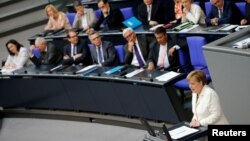Following Britain's historic vote to leave the EU, European leaders have begun to address how their relationship with their soon-to-be-former teammate will evolve.
Germany's Angela Merkel addressed the German parliament today, saying that though Britain will lose the privileges that come with being an EU member, it will remain a close ally in NATO. She also warned that the EU must not lose sight of other pressing issues, such as the migrant crisis, but instead grow even stronger together and prevent further breakup.
She cited Norway as an example of how Britain could be in its relation to Europe - a non-EU member which has access to the free market because of its willingness to respect free movement.
Merkel did, however, note that any formal discussion of the relationship would not occur until Britain begins the formal procedure to leave.
In an emergency session with European Parliament to discuss the Brexit vote, EU Commission President Jean-Claude Juncker said he hopes Britain can maintain friendly relations with the EU, but reiterated that negotiations would not be possible until Britain was certain of its position.
"We cannot allow ourselves to remain in a prolonged period of uncertainty," he said. "No notification, no negotiation."
Juncker has banned any "secret" meetings between British officials and those of individual nations, saying negotiations would only proceed in a transparent, EU-wide setting after the formal leave process has begun.
British voters approved leaving the EU by a narrow margin, but British Prime Minister David Cameron says the nation's parliament must ratify the decision before a leave process can begin. Cameron has already announced his resignation, having said he would respect the results of the referendum, though theoretically they could be reversed by the government.
If parliament ratifies the decision, the leave process would take two years, during which time the UK would continue to formally be an EU member.





